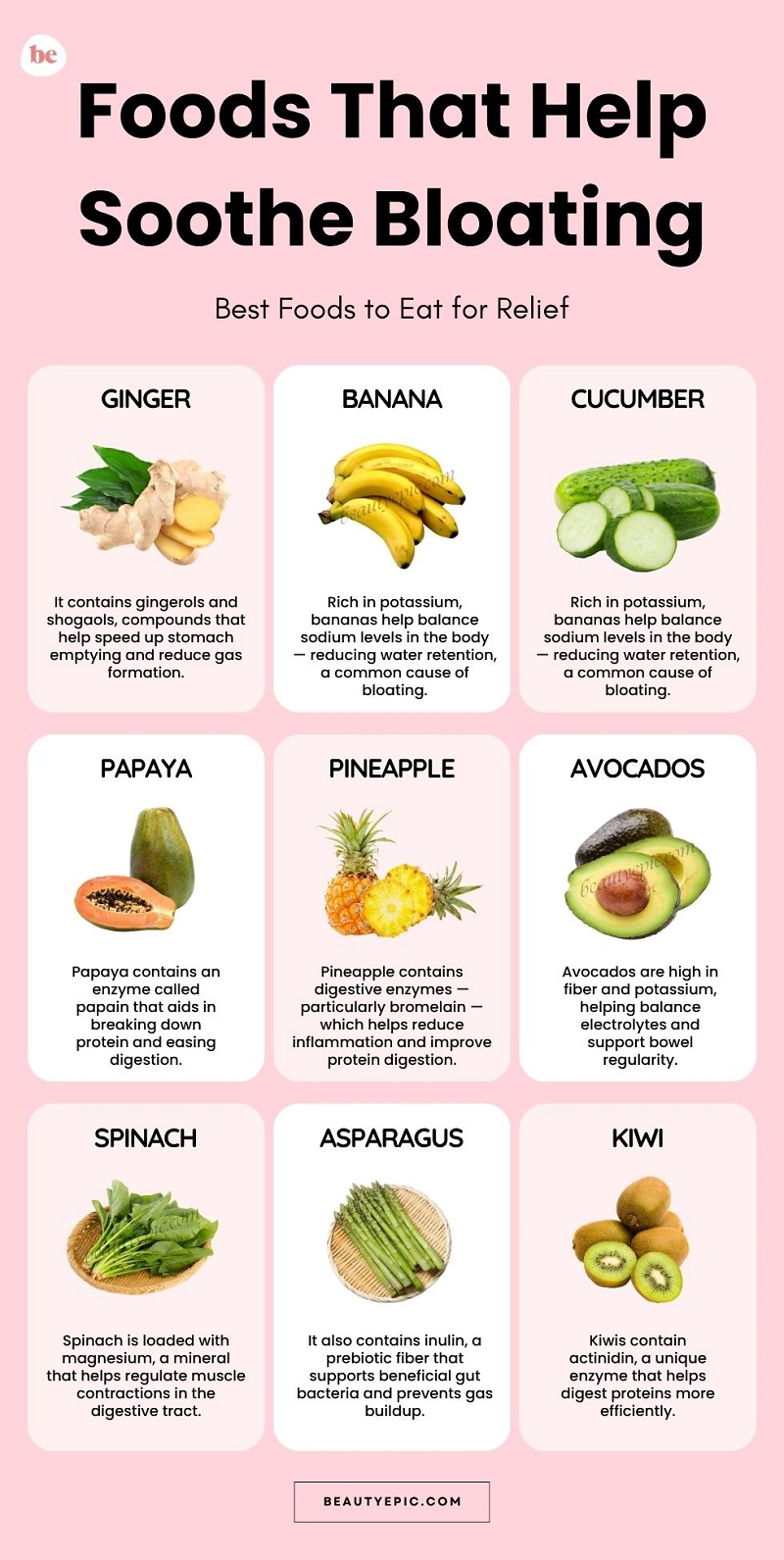
Important: This article is for informational purposes only. Please read our full disclaimer for more details.
Bloating — that tight, swollen feeling in your abdomen after eating — is one of the most common digestive complaints. It can be caused by a range of factors, from overeating and swallowing air while eating to hormonal changes and imbalances in gut bacteria.
While occasional bloating is normal, frequent bloating can affect your energy, mood, and confidence. The good news? Your diet plays a major role in controlling it. By knowing what to eat and what to avoid, you can significantly reduce bloating and promote a healthier digestive system.
Let’s explore the best and worst foods for bloating, backed by scientific research and expert insight.
Foods That Help Reduce Bloating Naturally
Some foods are gentle on your digestive system and actively work to reduce gas, inflammation, and water retention. Here are the best ones to include in your daily diet:
1. Ginger – A Natural Digestive Soother
Ginger has long been used in traditional medicine to relieve indigestion and bloating. It contains gingerols and shogaols, compounds that help the stomach empty more efficiently and reduce trapped gas.
According to a 2018 study in the World Journal of Gastroenterology, ginger improves gastric motility, helping food move smoothly through the digestive tract (1).
2. Bananas – Balance Sodium and Water Levels
High in potassium, bananas help counteract sodium-induced water retention — one of the biggest culprits behind bloating. Their soluble fiber content also supports healthy bowel movements.
3. Yogurt with Live Cultures – Strengthen Your Gut Flora
Probiotic-rich yogurt contains beneficial bacteria that promote a balanced gut microbiome, easing gas and bloating. A British Journal of Nutrition (2011) study found that daily probiotic intake significantly reduced bloating in people with mild digestive issues (2).
4. Papaya – The Enzyme-Rich Fruit for Digestion
Papaya contains papain, an enzyme that helps digest proteins and reduces the heavy feeling after meals. Research published in Neuro Endocrinology Letters (2013) found that papaya extract improved symptoms of bloating and constipation within weeks (3).
5. Cucumber – Hydrate and Deflate
Cucumbers are loaded with water and cucurbitacin, a compound that soothes the digestive tract. Their natural diuretic effect helps flush out excess sodium and reduce puffiness.
6. Fennel Seeds – Quick Relief for Gas
Fennel seeds contain anethole and fenchone, which relax intestinal muscles and release trapped gas. Drinking fennel tea or chewing the seeds after meals is a time-tested remedy for bloating.
7. Peppermint – Calm the Digestive Tract
Peppermint relaxes the muscles of the intestines, easing gas and cramps. A review in the Journal of Gastroenterology (2014) confirmed that peppermint oil effectively relieves symptoms of bloating and irritable bowel syndrome (IBS) (4).
Foods and Habits That Can Make Bloating Worse
Just as some foods help soothe your stomach, others can irritate it and lead to gas, inflammation, or fluid retention. Avoid or limit the following if you’re prone to bloating:
1. Carbonated Drinks
Soda, sparkling water, and beer release carbon dioxide gas into your digestive system, which can get trapped and cause bloating.
2. Cruciferous Vegetables (in excess)
Broccoli, cauliflower, and cabbage are highly nutritious but can produce excess gas when eaten raw or in large amounts due to their sulfur-containing compounds. Cooking them helps reduce their gas-forming effect.
3. Processed and Salty Foods
High-sodium snacks like chips, canned soups, and instant noodles cause your body to retain water, leading to a puffy, bloated feeling.
4. Artificial Sweeteners
Sugar substitutes such as sorbitol, xylitol, and mannitol are difficult for the body to digest and often ferment in the gut, producing gas.
5. Dairy Products (for lactose-sensitive individuals)
If you’re lactose intolerant, consuming milk, cheese, or ice cream can lead to bloating, cramps, and gas. Lactose-free alternatives or plant-based milks like almond or oat milk are gentler on digestion.
6. Legumes (without proper preparation)
Beans and lentils are rich in fiber and nutrients, but they contain oligosaccharides that cause gas. Soaking or sprouting them before cooking helps break down these compounds.
7. Fast Eating and Overeating
Swallowing air while eating too quickly or consuming large meals can trap gas in your digestive system, worsening bloating.
The Science Behind Bloating: What Research Tells Us
Modern research consistently points to gut bacteria balance, hydration, and fiber intake as key factors in managing bloating.
A World Journal of Gastroenterology (2019) review emphasized that probiotic-rich foods and natural enzymes (like those found in papaya and pineapple) support healthy digestion and reduce bloating (5).
Similarly, the Journal of Nutrition (2020) highlighted that potassium-rich foods — such as bananas and avocados — help maintain electrolyte balance, preventing water retention and stomach distension (6).
Experts also note that people with sensitive digestive systems should adopt a low-FODMAP diet, limiting fermentable carbohydrates found in some fruits, vegetables, and grains, to reduce gas buildup.
Frequently Asked Questions (FAQ’S)
1. How quickly can I reduce bloating through diet?
A. Most people notice improvements within a few days of avoiding trigger foods and including anti-bloating options like yogurt, cucumber, and ginger. For persistent bloating, it may take 1–2 weeks of consistent dietary changes.
2. Are probiotics always effective for bloating?
A. Probiotics can be highly effective for many people, but results depend on the strain and the person’s gut health. Look for strains like Lactobacillus acidophilus or Bifidobacterium lactis, which have shown positive results in clinical studies.
3. Can drinking more water reduce bloating?
A. Yes. Staying hydrated helps flush out excess sodium and supports healthy digestion. Ironically, dehydration can increase bloating because your body holds onto more water as a defense mechanism.
Bloating may feel inevitable at times, but your food choices can have a huge impact on how your stomach feels and functions. Focus on incorporating digestion-friendly foods like ginger, papaya, yogurt, and cucumbers — while limiting processed, salty, and gas-producing foods.
By eating slowly, drinking plenty of water, and listening to your body’s responses, you can prevent bloating before it starts. Remember, a calm and balanced gut is the foundation of overall wellness — and with the right foods, you can achieve both comfort and confidence from the inside out.
















